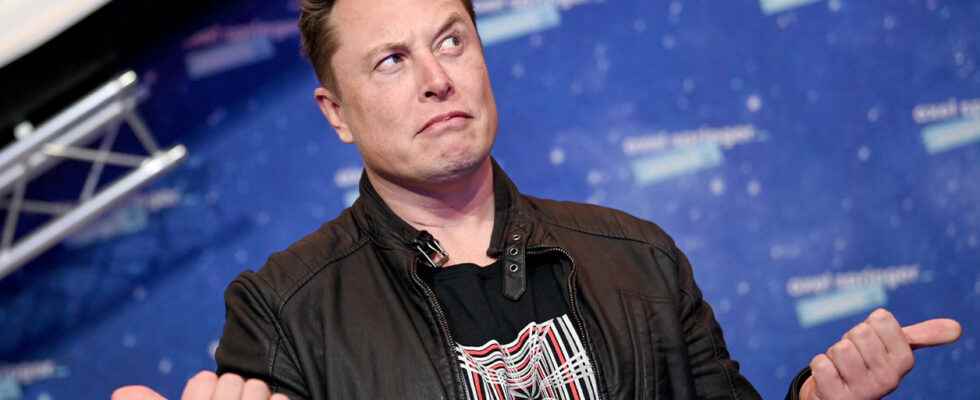Silicon Valley holds its breath. Elon Musk has been trying to grab Twitter for several days. And management resists. Back to a case that is getting bogged down and making a lot of noise.
- Elon Musk formalized at the beginning of April his entry into the capital of Twitter made last January. With 9.2% of the shares, he became the main shareholder. He then assured the American regulatory authorities that he did not want to influence the web giant’s strategic changes.
- At the same time, the boss of Tesla and SpaceX behaved like a troll, multiplying the provocative messages. He therefore proposed a survey asking Internet users if they wanted a button “edit” to edit a tweet after it was posted… Or said the platform was dying after pointing out the inactivity of heavily followed accounts.
Do you want an edit button?
— Elon Musk (@elonmusk) April 5, 2022
- Apparently paradoxically, on April 11 he ended up giving up joining Twitter’s board of directors as his boss Parag Agrawal offered him. But the CEO probably had an ulterior motive to neutralize it or at least keep it under control. He should, in fact, undertake not to own more than 15% of the shares.
- The most beautiful twist comes on Thursday, April 14, when Musk announces that he finally wants to buy all of Twitter for 43 billion dollars. Or 38% more than the share price at the time he made the offer.
- The next day, the company counter-attacks by adopting a protective clause. baptized “poison pill” by the financiers, it enables them to defend themselves against a hostile takeover bid. When an investor grabs more than 15% of the capital without the agreement of the board of directors, the others can buy new shares at a reduced price. This amounts to diluting the participation of the main shareholder. He finds himself having to pay a lot more than expected to get his hands on the rest. And the board of directors then has more time to possibly find another buyer. The corollary of this maneuver is to risk causing the Twitter share price to fall.
- Not enough to stop Elon Musk. He calls on his fans on Twitter to once again take part in a biased poll to protest against this poison pill.
Taking Twitter private at $54.20 should be up to shareholders, not the board
— Elon Musk (@elonmusk) April 14, 2022
- To top it off, Twitter founder Jack Dorsey is very critical of the service’s management.
it’s consistently been the dysfunction of the company
— jack⚡️ (@jack) April 17, 2022
- And Elon Musk can count on the unfailing support of the Winklevoss twins, shareholders of Twitter or other allied personalities.
- The private equity firms Apollo and Thomas Bravo have declared their interest in joining a financial package of buyers on April 18.
An epilogue on April 28?
In theory, Elon Musk has ample means to afford Twitter: he is the richest man in the world, with a fortune estimated by Forbes at more than 200 billion dollars. Except that he would have to sell shares in his other companies. He can also borrow this money, the Morgan Stanley bank being ready to grant him financing. Or join forces with other partners.
The suspense should end on April 28 with the publication of Twitter’s financial results. The board of directors could then reject Elon Musk’s offer and support another one. But the outcome of the case still seems totally uncertain today.
A compulsive tweeter with considerable influence
Contrary to appearances, this is not just a simple technological-financial soap opera. By saturating Twitter with his mockery and outbursts, Elon Musk managed to turn many users against the social network and even ridicule it. A kind of media putsch of an unprecedented level.
The methods of this agitator are reminiscent of those of former US President Donald Trump. Like him, Elon Musk is a compulsive tweeter. This allows him to communicate directly with the public and effectively defend his interests. Because he is not in nuance and does not hesitate to lie or break the law in his tweets. He was thus found guilty of manipulating Tesla’s stock price for his benefit with his messages. He did it again, for example, for the benefit of the Bitcoin cryptocurrency, then Dogecoin.
It must be said that it has more than 82 million subscribers, which gives it considerable power. So, of course, this libertarian does not look favorably on the moderation put in place by Twitter, nor any regulation in general. He did not hesitate to deal with “bastards” the regulators of the Securities and Exchange Commission (SEC), the American stock market policeman, at a TED conference in Vancouver last week.
Also see video:
The danger hangs over our data and democracy
The prospect of seeing Elon Musk take control of Twitter is frightening. Officially, he wants to defend freedom of expression and assures that it is necessary to withdraw the company from the stock market and transform it into an unlisted private company.
In this way, he would mostly end up with full control over Twitter. With the danger that the sensitive data that the platform holds on millions of people around the world will no longer be as well protected.
Elon Musk could also destroy the policy of moderation and the code of good conduct established by Twitter, in order to express himself without any hindrance and influence public opinion even more. The social network would then become its propaganda tool, at the very moment when Europe is trying to make GAFAM more responsible for their content.
